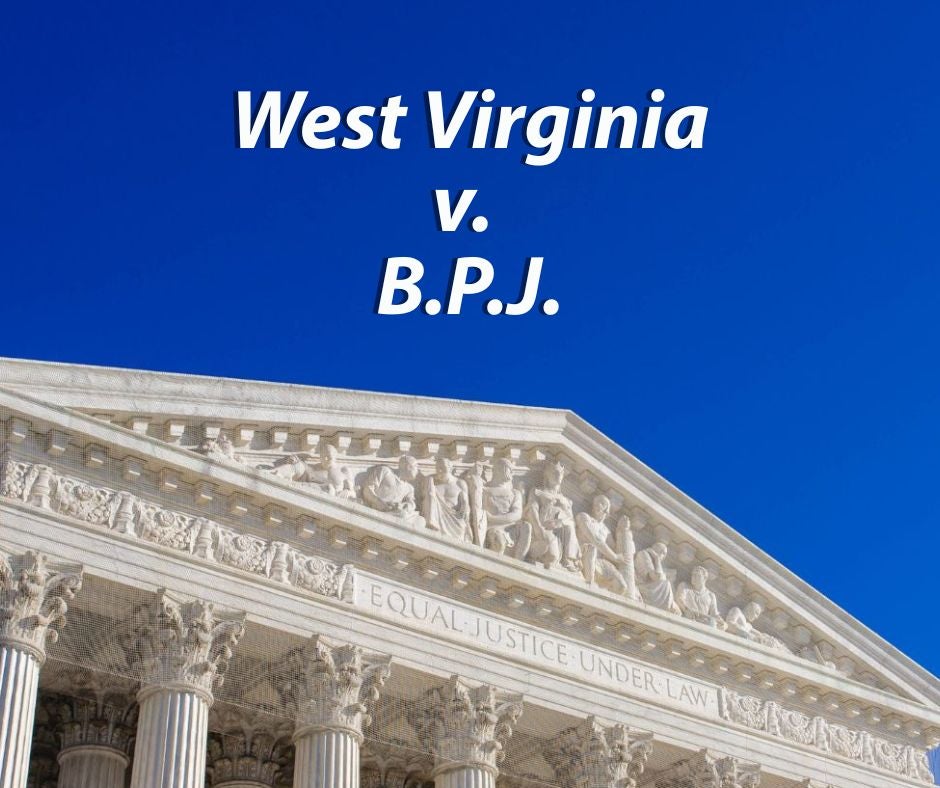
Summary
West Virginia v. B.P.J. is a Supreme Court case defending West Virginia's "Save Women's Sports Act," which requires student athletes to compete on sports teams based on their biological sex rather than their gender identity. The case involves B.P.J., a transgender girl who was born male but identifies as female, and her challenge to the state law that prevents her from competing on girls' sports teams. West Virginia argues that the law is necessary to preserve safety, fair competition and protect opportunities for biological females in athletics, citing physical advantages that biological males typically retain even after transitioning.
The state contends that allowing transgender girls to compete in girls' sports violates Title IX--the federal law designed to ensure equal athletic opportunities for women--by displacing biological females from teams, competitions and scholarships.
The case represents a significant legal battle over how to balance transgender students' rights with concerns about competitive fairness in women's and girls' sports. The Supreme Court's decision will likely have nationwide implications for school athletic policies.
What's This Case About?
West Virginia passed a law called the "Save Women's Sports Act" in 2021. This law says:
- Students must compete on sports teams based on their biological sex assigned at birth
- Biological males (including transgender girls) can only play on boys' or co-ed teams
- Biological females can play on any team (girls', boys', or co-ed teams)
A transgender girl named B.P.J. (who was born male but identifies as female) and her mother sued the state, saying this law violates:
- Title IX - the federal law that protects against sex discrimination in education
- The Equal Protection Clause - the part of the Constitution that says people should be treated equally
What Happened in Lower Courts?
- Initially, a judge blocked West Virginia's law
- While the law was blocked, B.P.J. competed on girls' teams and won many events, displacing hundreds of female competitors
- Later, the same judge changed his mind and ruled in favor of West Virginia
- But then an appeals court (the Fourth Circuit) reversed again and said West Virginia's law was illegal
West Virginia's Main Arguments
On Title IX:
- Title IX was designed to protect opportunities for biological females in sports
- The law allows sex-specific teams to ensure fair competition
- Allowing biological males to compete in girls' sports actually violates Title IX by taking away opportunities from biological females
- Title IX permits sex distinctions when they're necessary for equality
On Equal Protection:
- Biological males and females are not "similarly situated" when it comes to athletics due to physical differences
- The law treats all biological males the same way (they can play on boys' or co-ed teams)
- This is about biological sex, not discrimination against transgender people
- Even if it were about gender identity, the law would still be constitutional
The Bigger Picture
West Virginia argues that biological males generally have physical advantages in sports (strength, speed, etc.) that persist even with hormone treatments. They say allowing transgender girls to compete in girls' sports:
- Takes away opportunities from biological girls
- Makes competition unfair
- Goes against the original purpose of Title IX
The case represents a clash between protecting transgender students' rights and preserving what many see as fair competition in women's sports. The Supreme Court will ultimately decide how to balance these competing interests.
Ongoing Coverage
Supreme Court to hear State of West Virginia v. BPJ, the defense of the Save Women's Sports Act
West Virginia asks Supreme Court to hear boys in girls’ sports case
Attorney General McCuskey reacts to United States v. Skrmetti
Timeline
